|
TRANSLATE THIS ARTICLE
Integral World: Exploring Theories of Everything
An independent forum for a critical discussion of the integral philosophy of Ken Wilber
 David Christopher Lane, Ph.D.
Professor of Philosophy, Mt. San Antonio College Lecturer in Religious Studies, California State University, Long Beach Author of Exposing Cults: When the Skeptical Mind Confronts the Mystical (New York and London: Garland Publishers, 1994) and The Radhasoami Tradition: A Critical History of Guru Succession (New York and London: Garland Publishers, 1992). David Christopher Lane, Ph.D.
Professor of Philosophy, Mt. San Antonio College Lecturer in Religious Studies, California State University, Long Beach Author of Exposing Cults: When the Skeptical Mind Confronts the Mystical (New York and London: Garland Publishers, 1994) and The Radhasoami Tradition: A Critical History of Guru Succession (New York and London: Garland Publishers, 1992).
DOUBTING MIND
Great Skeptical Thinkers
Susan Blackmore |
Brian Cox |
Martin Gardner |
Sam Harris |
Christopher Hitchens |
Harry Houdini |
Ray Hyman |
Phillip J. Klass |
Joe Nickell |
James Randi |
Adam Savage |
Eugenie Scott
Martin GardnerTiffany Wang
Martin Gardner, born in Tulsa, Oklahoma, on the day October 21,1914, and he passed in May of 2010. Martin Gardner was most known for being a mathematician, and science writer, yet he was also a major figure in the promotion of skeptical thinking and for debunking charlatans and frauds who manipulated audiences with magic and sleight of hand claiming they had mystical powers they didn't. 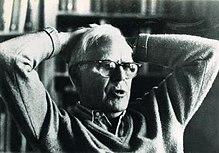 Martin Gardner To most people, math is a difficult subject since it relies on logic and precision. For many studying math was not a fun and interesting activity. However, it was a totally different situation for Martin Gardner who found the subject endlessly fascinating. Because of this, Martin Gardner wanted to make mathematics approachable and enjoyable as games and other daily life activities. Perhaps because he was not professionally trained to be a mathematician, it helped Martin Gardner to get more ordinary people into enjoying math. His writings and works done on math are not like textbooks or reference materials which tend to be dry and not engaging. What Martin Gardner did, instead, was to make math games which involve riddles and puzzles and labyrinths where one finds herself on an adventure that necessitates a solution. What was even better than the mathematical games Martin Gardner did was his introduction of magic tricks which used mathematics to better understand how they work. Many people know of Martin Gardner from his Scientific American column on recreational mathematics which was one of the most popular parts of the magazine for twenty-five years. Aside from the column,Martin Gardner had also published various mathematic puzzles, some of which are still readily available online. Martin Gardner has written multiple books, short stories, and essays. His annotated version of Alice's Adventures in Wonderland and Through the Looking Glass are great examples of how he helped readers try to unravel various mathematical conundrums that for most readers remain buried or unresolved. By writing on subjects that are not entirely about mathematics, yet still highlighting the math portion of the subject he showed how important understanding numbers is in all walks of life. Martin Gardner realized that people love puzzles and love adventures and that math is a wonderful way to unravel problems that may not resolved in any other way. He made math a tool for finding buried treasures which in turn allowed readers to enjoy math as a tool and not as some dreary and unnecessary subject in grammar and high school. Gardner was quite interested in magic, especially when it seemed to be violating the known laws of physics. He wanted to show that magic only “appeared” to conflating cause and effect because humans can easily be deceived. He wanted to show precisely how such magic tricks worked and why they were within the known laws of science. He wrote a brilliant book on this subject entitled, Mathematics, Magic and Mystery. The text introduced magic tricks that were performed based on understanding certain mathematical formulas. He also included those math based magic tricks in his writing for his Scientific American column. Because of his works on magic and mathematics, the magazine Magic named Martin Gardner one of the “100 Most Influential Magicians of the Twentieth Century” in 1999. Martin Gardner also received “Lifetime Achievement Award” in 2005 from the Academy of the Magical Arts. Martin Gardner and some fellow skeptics founded the Committee for the Scientific Investigation of Claims of the Paranormal (CSICOP) in 1976, which is now known as the Committee for Skeptical Inquiry (CSI). His contribution to the skeptical movement mainly came from his passion for science. Martin Gardner studied the claims and events that appear not to be explainable by science. In his first full length book Fads and Fallacies in the Name of Science, he critiqued cultic thinking and showed why pseudoscience is really anti-science. The following are a series of pregnant quotes from Martin Gardner that provide a glimpse into how he tied in math with clear and rational thinking. “The Annotated Alice, of course, does tie in with math, because Lewis Carroll was, as you know, a professional mathematician. So, it wasn't really too far afield from recreational math, because the two books are filled with all kinds of mathematical jokes. I was lucky there in that I really didn't have anything new to say in The Annotated Alice because I just looked over the literature and pulled together everything in the form of footnotes. But it was a lucky idea because that's been the best seller of all my books.” “As Bertrand Russell once wrote, two plus two is four even in the interior of the sun.” “Biographical history, as taught in our public schools, is still largely a history of boneheads: ridiculous kings and queens, paranoid political leaders, compulsive voyagers, ignorant generals—the flotsam and jetsam of historical currents. The men who radically altered history, the great creative scientists and mathematicians, are seldom mentioned if at all.” “Debunking bad science should be constant obligation of the science community, even if it takes time away from serious research or seems to be a losing battle. One takes comfort from the fact there is no Gresham's laws in science. In the long run, good science drives out bad.” “Mathematics is not only real, but it is the only reality. That is that entire universe is made of matter, obviously. And matter is made of particles. It's made of electrons and neutrons and protons. So the entire universe is made out of particles. Now what are the particles made out of? They're not made out of anything. The only thing you can say about the reality of an electron is to cite its mathematical properties. So there's a sense in which matter has completely dissolved and what is left is just a mathematical structure.” Further reading:1. Hermits and Cranks: Lessons from Martin Gardner on Recognizing Pseudoscientists, www.scientificamerican.com, May 23, 2010 2. My Best Mathematical and Logic Puzzles, Dover Publications, Incorporated; First Thus Used edition (February 16, 2016) 3. The Night Is Large, St. Martin's Griffin; First PB Edition, First Printing edition (July 15, 1997) 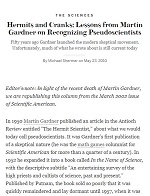 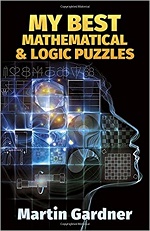 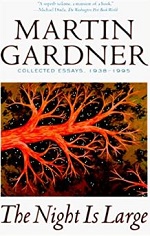
PREFACE | David Christopher Lane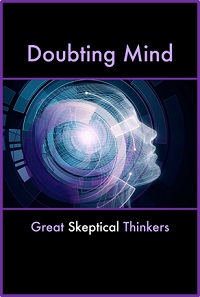
Before the current pandemic altered our day to day lives, the MSAC Philosophy Group had been working on a book entitled, Doubting Mind: Great Skeptical Thinkers, which contained separate essays on a number of notable researchers who champion critical thinking and skepticism when analyzing paranormal claims, such as UFOs, astrology, and various religious claims. The book has now been finished, though it took a bit longer than we anticipated. The word skeptical has too often been conflated with the word cynical. The former term comes from the Greek word skepsis which properly defined means "to look, view, observe." Or, as Miguel de Unamuno explained in 1924 in his book, Essays and Soliloquies, "Skeptic does not mean him who doubts, but him who investigates or researches as opposed to him who asserts and thinks that he has found." To be cynical, on the other hand, indicates that the person is "[pre] disposed to disbelieve or doubt the sincerity or value of social usages or personal character or motives and to express it by sarcasm and sneers, disparaging of the motives of others, captious, peevish." Therefore, it is important to understand that a skeptic is not one who ad hoc dismisses borderland ideas, but is one who is willing to go the extra mile to gather more (not less) information about any given phenomenon. As I have often remarked (to the obvious consternation of certain cult followers), we, humans, are too gullible when we accept miraculous claims without further investigation. We are cheap sluts for the paranormal, believing too easily in conspiracy theories that defy the known law of physics. There are many reasons why this is so, but I suspect that in a world where everything eventually eats one another to survive (whether it be a vegan eating plants or a carnivore eating meat), any organism that can develop a buffering illusion to survive such a horror show has an evolutionary advantage over others that cannot. This came into sharper relief for me this past week as I watching the British made television mini-series, War of the Worlds, where in one particularly poignant scene a mother who has just witnessed the death of her children at the hands of an alien species realizes that there is no point in continuing to live in such a horrific environment. She opts to shoot herself and the viewer instead of being shocked perfectly sympathizes with her decision. Nature is a madhouse if looked at objectively and therefore it is not surprising that we have evolved all sorts of mental defense systems in order to live long enough on terra firma to pass on our genetic heritage. Since we are the survivors in this boiling cauldron of eat or be eaten, we have inherited a variety of tools to ward off the true existential dread that can overcome any being that becomes too keenly aware of how this DNA game plays out. I mention all this as a necessary preface, since no matter how well versed we may become in science (and trained to become good doubters, in the positive sense of that term), we still retain at the core of our beings a deeply emotional component that defies a purely rational or logical way of being. We may act like scientists from time to time, but we are not scientists in the long term. We are vulnerable creatures and our myths and our fairy tales will persist even if we opt for agnosticism or atheism, though they may take on a different color and hue and justifications. Thus, this book provides us with but a small glimpse of how to think more rationally and critically, despite the sobering realization that we cannot be great skeptics all the time.
Comment Form is loading comments...
|